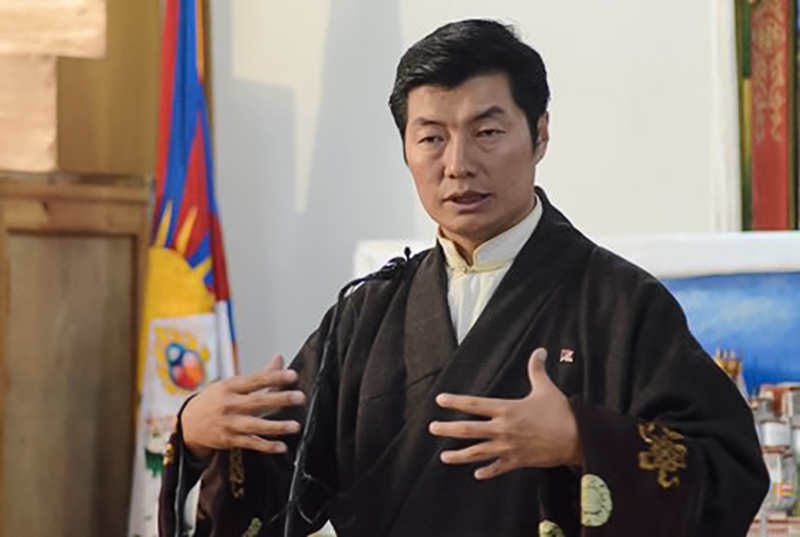 Dharamshala — The President of Central Tibetan Administration Dr Lobsang Sangay Thursday renewed his calls for Chinese Nobel Peace laureate Liu Xiaobo to be allowed to travel abroad for treatment.
Dharamshala — The President of Central Tibetan Administration Dr Lobsang Sangay Thursday renewed his calls for Chinese Nobel Peace laureate Liu Xiaobo to be allowed to travel abroad for treatment.
"The Chinese Government cannot allow Liu Xiaobo to die. They should allow him the opportunity to travel abroad for medical treatment on humanitarian grounds," he said, as he joined the growing global call to allow the cancer stricken Nobel laureate for treatment abroad.
"Liu Xiaobo's condition is reported to be worsening rapidly. If he dies without receiving proper medical treatment, the Chinese Government should be held responsible for his death," he said on Thursday, July 13, according to the official website of the CTA.
President Dr Sangay had earlier issued a statement expressing his sadness at reports of Liu Xiaobo being diagnosed with late stage cancer and his subsequent medical parole. He has urged the Chinese leadership to grant Liu Xiaobo and his family immediate permission to travel abroad for medical treatment.
However, despite the crescendo of clamor and concern from countries on the Nobel laureate's condition, the Chinese government has rebuffed international appeals to let Liu seek treatment abroad, saying he is getting the best possible care from top domestic doctors.
Various media agencies have reported that Liu Xiaobo suffered a bout of respiratory failure as his condition worsened on Wednesday, even as Germany offered to host him for treatment and rights groups decried the lack of independent information.
The First Hospital of China Medical University in the northeastern Chinese city of Shenyang, where Liu Xaiobo is currently receiving medical care, have said that the democracy advocate's liver function had deteriorated despite three days of anti-infection and blood treatment, sparking concerns on the safety of him being moved abroad.
However, two foreign doctors, from the United States and Germany, who visited Liu on Saturday, 8 July, stated that Liu is frail but well enough to be taken overseas if done quickly.
"There still is a window of opportunity [to move Liu] but it is rapidly closing," they have said. "It seems the leadership ... has decided to ride it out, irrespective of the considerable reputational damage."
Liu Xiaobo, 61, was arrested in 2008 after writing a pro-democracy manifesto called Charter 08, in which he called for an end to one-party rule and improvements in human rights. Following a year in detention and a two-hour trial, he was sentenced to 11 years in December 2009 for inciting subversion of state power. On 26 June 2017, he was granted medical parole after being diagnosed with terminal liver cancer.
If China doesn't allow Liu Xiaobo's medical treatment abroad, Liu risks becoming the first Nobel Peace Prize laureate to die in custody since German pacifist Carl von Ossietzky, who passed away in a hospital under the Nazis in 1938.
"China must save Liu Xiaobo's life. Or risk becoming a pariah state," President Dr Sangay said.
Liu Xiaobo, 61, was arrested in 2008 after writing a pro-democracy manifesto called Charter 08, in which he called for an end to one-party rule and improvements in human rights. Following a year in detention and a two-hour trial, he was sentenced to 11 years in December 2009 for inciting subversion of state power.
Poet and human rights activist Liu, who was represented by an empty chair at his 2010 Nobel prize ceremony, was detained in 2008 and sentenced to 11 years in prison. On 26 June 2017, he was granted medical parole after being diagnosed with terminal liver cancer.
The international media watchdog RSF says China is still one of the world's biggest prisons for journalists, which also ranked near the bottom of RSF's 2017 World Press Freedom Index – 176th out of 180 countries.


![Tibet has a rich history as a sovereign nation until the 1950s when it was invaded by China. [Photo: File]](/images/stories/Pics-2024/March/Tibet-Nation-1940s.jpg#joomlaImage://local-images/stories/Pics-2024/March/Tibet-Nation-1940s.jpg?width=1489&height=878)















